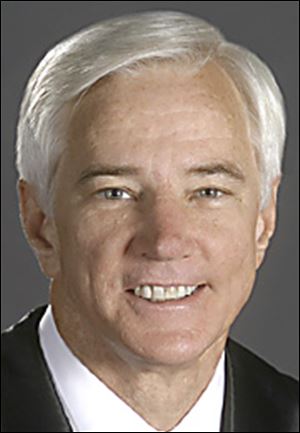
General Election: Ohio Supreme Court
Justice, lawyer fight for seat on high court bench
10/21/2012
Republican Ohio Supreme Court Justice Terrence O'Donnell.
COLUMBUS—Twelve years ago, then-candidate Terrence O’Donnell found himself in the middle of an Ohio Supreme Court political firestorm as a business-backed group went after his Democratic opponent, incumbent Justice Alice Robie Resnick, in an expensive, highly negative campaign.
The Republican appeals court judge lost that race in the backlash that followed and later complained that he felt his campaign had been hijacked by the Ohio Chamber of Commerce-led group.
Since then, the state’s top court has been almost entirely remade with just two of the justices who were on the bench then still there today. Justice Resnick of Ottawa Hills has retired, and now incumbent Justice Donnell is going before voters for the third time since then.
There’s no sign of the acrimony seen in 2000. The races for his and two other high court seats are largely flying under the radar.
The court is dominated 6-1 by Republicans, and the philosophical divides and internal disputes that helped to fuel that 2000 political fight have seemingly disappeared.
“In all of his years as chief justice, [the late] Tom Moyer was hoping for collegiality and was trying to lead collegiality,” Justice O’Donnell said. “He could not implement it. It came with the advent of different members of the court, and when the jurists changed, there became a very cohesive body.
“Not that we all agree,” he said. “We’re still individuals, so we vote cases individually. … The level of respect and the level of understanding and appreciation of those differences engender a great level of congeniality. I’ve never enjoyed anything different in my time on the court.”
Justice O’Donnell made it to the Supreme Court in 2003 when he was appointed to a vacancy by then Gov. Bob Taft. A year later, voters ratified that decision. He won his first full six-year term in 2006 and is now asking for a final term.
He faces opposition from state Sen. Mike Skindell (D., Lakewood), who stepped into a void on the ballot when the first Democratic candidate quietly bowed out. Judicial candidates run in partisan primaries in Ohio, but they appear on the general election ballot without party labels.
Justice O’Donnell, 66, of Rocky River, cites his years on multiple courts, noting that death-penalty cases go directly to the Supreme Court on appeal. He said Mr. Skindell, as a practicing attorney, doesn’t have the 12 hours of credit required in capital cases to be assigned by a court to such a case.
Mr. Skindell, however, notes that he could be directly hired by death-penalty defendants.
“When he loses ... he wouldn’t be qualified to handle those indigent appointments either because he doesn’t qualify for it,” Mr. Skindell said. “I have more practicing years as an attorney than he does, more experience practicing law in federal court, in state court, at agency levels. He has not had that.
“All the times that he’s gone places, if I’m not mistaken, he has first been appointed, and then he’s run to retain that seat,” he said.
Despite their vastly different experiences, the Ohio State Bar Association has rated both candidates equally at “recommended.”
“I’ve got a 32-year judicial career,” Justice O’Donnell said. “I’ve been a trial court judge in Cuyahoga County, the busiest trial court in Ohio. I’ve tried capital murder cases and civil cases. I’ve tried every type of felony. I’ve charged hundreds of juries. I’ve sentenced probably thousands of defendants, granted probation, revoked probation, written opinions.
“In the court of appeals, I was there eight years,” he said. “I’m now starting on my 10th year on the Supreme Court of Ohio.”
In his separate race against Republican Justice Robert Cupp, Democratic candidate William O’Neill has made an issue out of justices accepting campaign contributions from parties and attorneys with cases before the court.
Unlike Mr. O’Neill, Mr. Skindell has not sworn off campaign fund-raising. But he has criticized Justice O’Donnell for not disqualifying himself from cases in which he has received contributions from parties.
“Our rules provide that if you accept a contribution within the regulated limits, then it is not conduct that is in violation of the [Code of Judicial Conduct],” Justice O’Donnell said. “So we don’t want a lawyer giving a contribution of $50 or $100 to a sentencing judge [and then saying,] ‘You can’t sentence my client, I gave you $50 for your campaign.’ It would be a great way to get certain judges off cases and you’d always be in front of certain other judges.”
Contact Jim Provance at: jprovance@theblade.com or 614-221-0496.